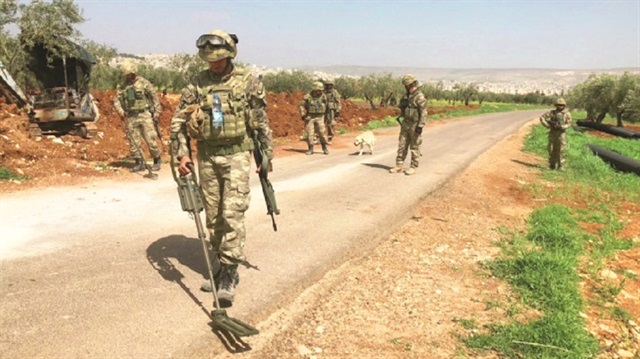
Daesh’s explosives specialists were trained by Western and U.S. intelligence services, which are now being used against the Turkish Armed Forces (TAF) and the Free Syrian Army (FSA)
Explosives specialists from Daesh that were trained and dispatched by the U.S. from Raqqa helped terrorists from the Kurdistan Workers’ Party (PKK) booby-trap six regions in Syria’s Afrin before fleeing from Turkish army fire during Operation Olive Branch, according to the president of Tal Abyad’s Local Council.
Daesh’s explosives specialists were trained by Western and U.S. intelligence services, which are now being used against the Turkish Armed Forces (TAF) and the Free Syrian Army (FSA), according to the head of Tal Abyad’s Local Council Akram Dada who spoke to Yeni Şafak daily about a secret deal between Daesh and the U.S.-PKK alliance.
He stated Western specialists set up special mining fields to train Daesh terrorists in Iraq’s Mosul and Syria’s Abel.
“Despite Raqqa being one of the largest provinces in Syria in terms of surface area, a small city in Aleppo such as Afrin was booby-trapped by 25-fold,” said Dada.
Turkey launched Operation Olive Branch on Jan. 20 to clear YPG/PKK and Daesh terrorist groups from Afrin in northwestern Syria amid growing threats from the region.
A crew of 70 Daesh explosives specialists was dispatched from Raqqa by the U.S. to six PKK-occupied regions to plant mines, says Dada.
Daesh terrorists struck a deal with the U.S. and the PKK to fight against the Turkish Army and the FSA in return for not only theirs and their families’ freedom, but also of the families of those they’re willing to vouch for.
On March 18, Turkish-backed troops liberated Afrin town center, which had been a major hideout for the YPG/PKK since 2012, and is currently conducting de-mining activities in the region.
Some of the terrorists who remained at large were dispatched to assume duties and carry out terror attacks in the Euphrates Shield region and Afrin, with the help of PKK terrorists who smuggled them into TAF-controlled areas such as Idlib, al-Bab, Jarabulus and Azaz.
Other terrorists and their families are sent back to their countries of origin with the help of Western intelligence services in Erbil without facing any trials upon their return, a reward for their taking part in the alliance formed between the West and PKK.
Additionally Dada stated that one need not look further than the Euphrates Shield region and Afrin to understand the ploy that was hatched, as these areas were heavily booby-trapped by Daesh terrorists, in sharp contrast to hundreds of towns and villages that changed hands between the former and PKK terrorists, such as Sulok, Ayn Issa, Hasakah, Rasulayn, Tabqah, Manbij, Ayn al-Arab and Tal Abyad, that were passed over without the slightest sign of resistance.
“Between 30 to 35 towns changed hands between Daesh and the PKK a day. How strange is it that when facing the Turkish Armed Forces and the Free Syrian Army, they left no stone unmined, yet against the PKK they did no such thing?” asked Dada.
The PKK is listed as a terrorist organization by Turkey, the European Union and the United States. The PKK has been conducting armed violence in the southeastern part of Turkey since 1984. More than 40,000 people, mostly civilians, have been killed in the three-decade long conflict.




